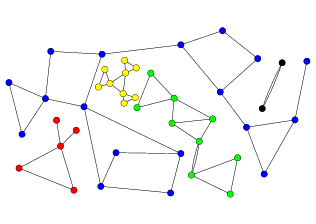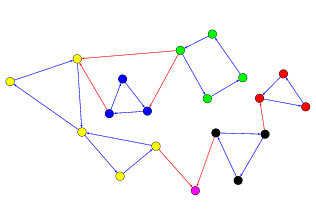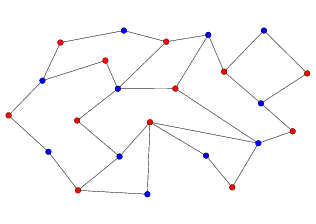This group contains the algorithms for discovering the graph properties like connectivity, bipartiteness, euler property, simplicity etc.
Classes | |
| class | EulerIt< GR > |
| Euler tour iterator for graphs. More... | |
Files | |
| file | connectivity.h |
Connectivity algorithms. | |
| file | euler.h |
Euler tour iterators and a function for checking the Eulerian property. | |
Functions | |
| template<typename Graph > | |
| bool | connected (const Graph &graph) |
| Check whether an undirected graph is connected. | |
| template<typename Graph > | |
| int | countConnectedComponents (const Graph &graph) |
| Count the number of connected components of an undirected graph. | |
| template<class Graph , class NodeMap > | |
| int | connectedComponents (const Graph &graph, NodeMap &compMap) |
| Find the connected components of an undirected graph. | |
| template<typename Digraph > | |
| bool | stronglyConnected (const Digraph &digraph) |
| Check whether a directed graph is strongly connected. | |
| template<typename Digraph > | |
| int | countStronglyConnectedComponents (const Digraph &digraph) |
| Count the number of strongly connected components of a directed graph. | |
| template<typename Digraph , typename NodeMap > | |
| int | stronglyConnectedComponents (const Digraph &digraph, NodeMap &compMap) |
| Find the strongly connected components of a directed graph. | |
| template<typename Digraph , typename ArcMap > | |
| int | stronglyConnectedCutArcs (const Digraph &digraph, ArcMap &cutMap) |
| Find the cut arcs of the strongly connected components. | |
| template<typename Graph > | |
| bool | biNodeConnected (const Graph &graph) |
| Check whether an undirected graph is bi-node-connected. | |
| template<typename Graph > | |
| int | countBiNodeConnectedComponents (const Graph &graph) |
| Count the number of bi-node-connected components of an undirected graph. | |
| template<typename Graph , typename EdgeMap > | |
| int | biNodeConnectedComponents (const Graph &graph, EdgeMap &compMap) |
| Find the bi-node-connected components of an undirected graph. | |
| template<typename Graph , typename NodeMap > | |
| int | biNodeConnectedCutNodes (const Graph &graph, NodeMap &cutMap) |
| Find the bi-node-connected cut nodes in an undirected graph. | |
| template<typename Graph > | |
| bool | biEdgeConnected (const Graph &graph) |
| Check whether an undirected graph is bi-edge-connected. | |
| template<typename Graph > | |
| int | countBiEdgeConnectedComponents (const Graph &graph) |
| Count the number of bi-edge-connected components of an undirected graph. | |
| template<typename Graph , typename NodeMap > | |
| int | biEdgeConnectedComponents (const Graph &graph, NodeMap &compMap) |
| Find the bi-edge-connected components of an undirected graph. | |
| template<typename Graph , typename EdgeMap > | |
| int | biEdgeConnectedCutEdges (const Graph &graph, EdgeMap &cutMap) |
| Find the bi-edge-connected cut edges in an undirected graph. | |
| template<typename Digraph > | |
| bool | dag (const Digraph &digraph) |
| Check whether a digraph is DAG. | |
| template<typename Digraph , typename NodeMap > | |
| void | topologicalSort (const Digraph &digraph, NodeMap &order) |
| Sort the nodes of a DAG into topolgical order. | |
| template<typename Digraph , typename NodeMap > | |
| bool | checkedTopologicalSort (const Digraph &digraph, NodeMap &order) |
| Sort the nodes of a DAG into topolgical order. | |
| template<typename Graph > | |
| bool | acyclic (const Graph &graph) |
| Check whether an undirected graph is acyclic. | |
| template<typename Graph > | |
| bool | tree (const Graph &graph) |
| Check whether an undirected graph is tree. | |
| template<typename Graph > | |
| bool | bipartite (const Graph &graph) |
| Check whether an undirected graph is bipartite. | |
| template<typename Graph , typename NodeMap > | |
| bool | bipartitePartitions (const Graph &graph, NodeMap &partMap) |
| Find the bipartite partitions of an undirected graph. | |
| template<typename Graph > | |
| bool | loopFree (const Graph &graph) |
| Check whether the given graph contains no loop arcs/edges. | |
| template<typename Graph > | |
| bool | parallelFree (const Graph &graph) |
| Check whether the given graph contains no parallel arcs/edges. | |
| template<typename Graph > | |
| bool | simpleGraph (const Graph &graph) |
| Check whether the given graph is simple. | |
| template<typename GR > | |
| bool | eulerian (const GR &g) |
| Check if the given graph is Eulerian. | |
| bool lemon::connected | ( | const Graph & | graph | ) |
This function checks whether the given undirected graph is connected, i.e. there is a path between any two nodes in the graph.
true if the graph is connected. | int lemon::countConnectedComponents | ( | const Graph & | graph | ) |
This function counts the number of connected components of the given undirected graph.
The connected components are the classes of an equivalence relation on the nodes of an undirected graph. Two nodes are in the same class if they are connected with a path.
| int lemon::connectedComponents | ( | const Graph & | graph, |
| NodeMap & | compMap | ||
| ) |
This function finds the connected components of the given undirected graph.
The connected components are the classes of an equivalence relation on the nodes of an undirected graph. Two nodes are in the same class if they are connected with a path.

| graph | The undirected graph. |
| compMap | A writable node map. The values will be set from 0 to the number of the connected components minus one. Each value of the map will be set exactly once, and the values of a certain component will be set continuously. |
| bool lemon::stronglyConnected | ( | const Digraph & | digraph | ) |
This function checks whether the given directed graph is strongly connected, i.e. any two nodes of the digraph are connected with directed paths in both direction.
true if the digraph is strongly connected. | int lemon::countStronglyConnectedComponents | ( | const Digraph & | digraph | ) |
This function counts the number of strongly connected components of the given directed graph.
The strongly connected components are the classes of an equivalence relation on the nodes of a digraph. Two nodes are in the same class if they are connected with directed paths in both direction.
| int lemon::stronglyConnectedComponents | ( | const Digraph & | digraph, |
| NodeMap & | compMap | ||
| ) |
This function finds the strongly connected components of the given directed graph. In addition, the numbering of the components will satisfy that there is no arc going from a higher numbered component to a lower one (i.e. it provides a topological order of the components).
The strongly connected components are the classes of an equivalence relation on the nodes of a digraph. Two nodes are in the same class if they are connected with directed paths in both direction.

| digraph | The digraph. |
| compMap | A writable node map. The values will be set from 0 to the number of the strongly connected components minus one. Each value of the map will be set exactly once, and the values of a certain component will be set continuously. |
| int lemon::stronglyConnectedCutArcs | ( | const Digraph & | digraph, |
| ArcMap & | cutMap | ||
| ) |
This function finds the cut arcs of the strongly connected components of the given digraph.
The strongly connected components are the classes of an equivalence relation on the nodes of a digraph. Two nodes are in the same class if they are connected with directed paths in both direction. The strongly connected components are separated by the cut arcs.
| digraph | The digraph. |
| cutMap | A writable arc map. The values will be set to true for the cut arcs (exactly once for each cut arc), and will not be changed for other arcs. |
| bool lemon::biNodeConnected | ( | const Graph & | graph | ) |
This function checks whether the given undirected graph is bi-node-connected, i.e. any two edges are on same circle.
true if the graph bi-node-connected. | int countBiNodeConnectedComponents | ( | const Graph & | graph | ) |
This function counts the number of bi-node-connected components of the given undirected graph.
The bi-node-connected components are the classes of an equivalence relation on the edges of a undirected graph. Two edges are in the same class if they are on same circle.
| int lemon::biNodeConnectedComponents | ( | const Graph & | graph, |
| EdgeMap & | compMap | ||
| ) |
This function finds the bi-node-connected components of the given undirected graph.
The bi-node-connected components are the classes of an equivalence relation on the edges of a undirected graph. Two edges are in the same class if they are on same circle.
| graph | The undirected graph. |
| compMap | A writable edge map. The values will be set from 0 to the number of the bi-node-connected components minus one. Each value of the map will be set exactly once, and the values of a certain component will be set continuously. |
| int lemon::biNodeConnectedCutNodes | ( | const Graph & | graph, |
| NodeMap & | cutMap | ||
| ) |
This function finds the bi-node-connected cut nodes in the given undirected graph.
The bi-node-connected components are the classes of an equivalence relation on the edges of a undirected graph. Two edges are in the same class if they are on same circle. The bi-node-connected components are separted by the cut nodes of the components.
| graph | The undirected graph. |
| cutMap | A writable node map. The values will be set to true for the nodes that separate two or more components (exactly once for each cut node), and will not be changed for other nodes. |
| bool lemon::biEdgeConnected | ( | const Graph & | graph | ) |
This function checks whether the given undirected graph is bi-edge-connected, i.e. any two nodes are connected with at least two edge-disjoint paths.
true if the graph is bi-edge-connected. | int countBiEdgeConnectedComponents | ( | const Graph & | graph | ) |
This function counts the number of bi-edge-connected components of the given undirected graph.
The bi-edge-connected components are the classes of an equivalence relation on the nodes of an undirected graph. Two nodes are in the same class if they are connected with at least two edge-disjoint paths.
| int lemon::biEdgeConnectedComponents | ( | const Graph & | graph, |
| NodeMap & | compMap | ||
| ) |
This function finds the bi-edge-connected components of the given undirected graph.
The bi-edge-connected components are the classes of an equivalence relation on the nodes of an undirected graph. Two nodes are in the same class if they are connected with at least two edge-disjoint paths.
| graph | The undirected graph. |
| compMap | A writable node map. The values will be set from 0 to the number of the bi-edge-connected components minus one. Each value of the map will be set exactly once, and the values of a certain component will be set continuously. |
| int lemon::biEdgeConnectedCutEdges | ( | const Graph & | graph, |
| EdgeMap & | cutMap | ||
| ) |
This function finds the bi-edge-connected cut edges in the given undirected graph.
The bi-edge-connected components are the classes of an equivalence relation on the nodes of an undirected graph. Two nodes are in the same class if they are connected with at least two edge-disjoint paths. The bi-edge-connected components are separted by the cut edges of the components.
| graph | The undirected graph. |
| cutMap | A writable edge map. The values will be set to true for the cut edges (exactly once for each cut edge), and will not be changed for other edges. |
| bool lemon::dag | ( | const Digraph & | digraph | ) |
This function checks whether the given digraph is DAG, i.e. Directed Acyclic Graph.
true if there is no directed cycle in the digraph. | void lemon::topologicalSort | ( | const Digraph & | digraph, |
| NodeMap & | order | ||
| ) |
This function sorts the nodes of the given acyclic digraph (DAG) into topolgical order.
| digraph | The digraph, which must be DAG. |
| order | A writable node map. The values will be set from 0 to the number of the nodes in the digraph minus one. Each value of the map will be set exactly once, and the values will be set descending order. |
| bool lemon::checkedTopologicalSort | ( | const Digraph & | digraph, |
| NodeMap & | order | ||
| ) |
This function sorts the nodes of the given acyclic digraph (DAG) into topolgical order and also checks whether the given digraph is DAG.
| digraph | The digraph. |
| order | A readable and writable node map. The values will be set from 0 to the number of the nodes in the digraph minus one. Each value of the map will be set exactly once, and the values will be set descending order. |
false if the digraph is not DAG.| bool lemon::acyclic | ( | const Graph & | graph | ) |
This function checks whether the given undirected graph is acyclic.
true if there is no cycle in the graph. | bool lemon::tree | ( | const Graph & | graph | ) |
This function checks whether the given undirected graph is tree.
true if the graph is acyclic and connected. | bool lemon::bipartite | ( | const Graph & | graph | ) |
The function checks whether the given undirected graph is bipartite.
true if the graph is bipartite.| bool lemon::bipartitePartitions | ( | const Graph & | graph, |
| NodeMap & | partMap | ||
| ) |
This function checks whether the given undirected graph is bipartite and gives back the bipartite partitions.

| graph | The undirected graph. |
| partMap | A writable node map of bool (or convertible) value type. The values will be set to true for one component and false for the other one. |
true if the graph is bipartite, false otherwise.| bool lemon::loopFree | ( | const Graph & | graph | ) |
This function returns true if there are no loop arcs/edges in the given graph. It works for both directed and undirected graphs.
| bool lemon::parallelFree | ( | const Graph & | graph | ) |
This function returns true if there are no parallel arcs/edges in the given graph. It works for both directed and undirected graphs.
| bool lemon::simpleGraph | ( | const Graph & | graph | ) |
This function returns true if the given graph is simple, i.e. it contains no loop arcs/edges and no parallel arcs/edges. The function works for both directed and undirected graphs.
| bool lemon::eulerian | ( | const GR & | g | ) |
This function checks if the given graph is Eulerian. It works for both directed and undirected graphs.
By definition, a digraph is called Eulerian if and only if it is connected and the number of incoming and outgoing arcs are the same for each node. Similarly, an undirected graph is called Eulerian if and only if it is connected and the number of incident edges is even for each node.
 1.7.3
1.7.3